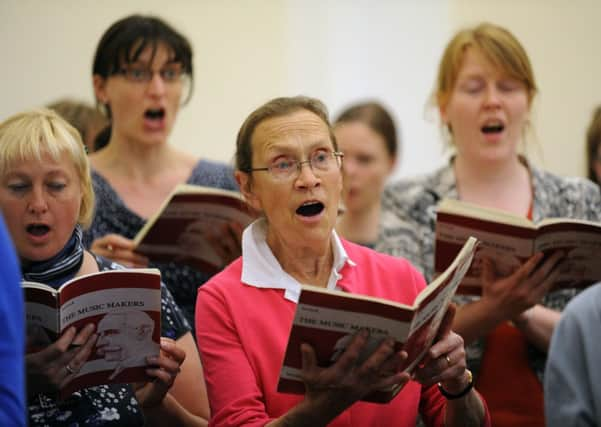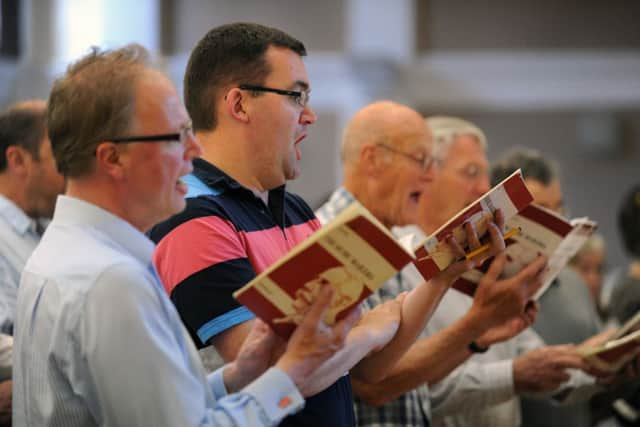Beyond the pomp


He stayed in a “horrid” hotel room during one visit and had a bad attack of toothache. He felt too ill to attend a civic banquet and was refused entry to the concert hall where his music was being played. But, by and large, Sir Edward Elgar enjoyed his trips to Sheffield.
At the turn of the 20th century, the city boasted a choir that was, he reckoned, “absolutely the finest in the world”. And, perhaps more importantly, Sheffield was where he first conducted his “greatest hit” – Land of Hope and Glory.
Advertisement
Hide AdAdvertisement
Hide AdAs part of the strutting first Pomp and Circumstance march, this hymn to nationalism is indelibly associated with the Last Night of the Proms, that jamboree of flag-waving and streamer-throwing whose rituals can seem so toe-curlingly twee; sad that it may be many people’s major experience of classical music.


In this 80th anniversary year of Elgar’s death, however, the Proms’ First Night (on July 18) offers a very different insight into his character: his deeply religious oratorio The Kingdom.
“Elgar is often regarded as an imperialist, a jingoistic tub-thumper and nothing more,” says Professor Bernard Porter. “All those people belting out Land of Hope and Glory – as though Britain has a vestige of either left.” A ripple of laughter goes round the room as Porter, a leading imperial historian and former lecturer at Hull University, launches a talk on “Elgar and the Empire”.
It’s a sunny Saturday afternoon in York and two-dozen members of the Yorkshire and North-East branch of the Elgar Society (the biggest British society devoted to a single composer) have come from all over the county to the Bar Convent for one of their regular meetings.
Advertisement
Hide AdAdvertisement
Hide AdIt coincides with York races and fancily-dressed crowds of race-goers are surging past the windows. Elgar would have approved; a racing man himself, he once cut short a rehearsal of his Violin Concerto with the young Yehudi Menuhin to go to Newmarket.
Elgar was also a frequent visitor to Yorkshire, often conducting in Sheffield and Leeds on the circuit of British festivals around which composers touted their latest choral works. His oratorio Caractacus was premiered at the 1898 Leeds Festival, with the purely orchestral Falstaff – for some Elgarians, his finest work – following in 1913.
Two years earlier, Harrogate saw the first performance outside London of the Second Symphony and Elgar conducted the Sheffield Choir on its tour of Canada and the USA. He didn’t enjoy the tour – but then, it’s hard to imagine such a whole-hearted Man of Worcestershire feeling at home in Chicago, Buffalo, Cincinnati, Indianapolis or Milwaukee.
He was more in tune with Yorkshire, where he had two important friendships. One was with Alice Stuart-Wortley, daughter of the artist Sir John Millais and wife of a Sheffield MP. He found her an inspiration for his work and it’s thought that the enigmatic five-asterisk dedication of his Violin Concerto refers to her.
Advertisement
Hide AdAdvertisement
Hide AdThen there was Charles Buck, a doctor from Giggleswick. They met as young men in 1882 and Elgar visited Buck several times over the years. They walked and talked and on one visit Elgar wrote Salut d’Amour, one of his most popular pieces, which he ill-advisedly sold outright to his publishers (no royalties) for £5.
As WR Mitchell points out in his book Edward Elgar in the Yorkshire Dales, the composer reminisced about the area when he visited Bradford-born Frederick Delius at his home in France the year before both their deaths. Surprisingly, they hit it off. Though very different composers – and very different characters – they shared a keen nostalgia which often suffuses their works.
Back at the York meeting, Prof Porter is in full entertaining flow. He offers an alternative take on Elgar’s reputation as a stuffed-shirt reactionary, writing ermine-trimmed music for state occasions and so entrenched in the Establishment that the labels of his gramophone records could hardly find space for all the official honours after his name.
What, Porter is asked, is the appeal of Elgar’s music to him? “His emotional depth,” he says, without hesitation. Other society members echo him. “I can shed a few tears over some of the music,” says Marc Seccombe, from Doncaster. Not, he says, “the Pomp and Circumstance stuff”, but such oratorios as The Dream of Gerontius, a searingly Catholic vision of the soul’s journey after death.
Advertisement
Hide AdAdvertisement
Hide Ad“He reaches parts other composers don’t reach,” says Sylvia Bennett, a member of the Sheffield Philharmonic Chorus for 40 years. “He seems to write just for you; it’s personal. You think: ‘I know what you’re saying there; I’ve been there.’ The Violin Concerto is absolutely dripping in passion; the Cello Concerto is almost too emotional – I don’t like listening to it in public; and the First Symphony is glorious...”
She sang in many Gerontius performances, particularly in Manchester and at Sheffield City Hall, under Sir John Barbirolli, the most blazingly passionate of Elgar conductors, and took part in his great 1965 recording of the work, with Janet Baker among the soloists. “He was nearly always in tears when he was conducting it,” she recalls. “You couldn’t always follow his beat; he conducted with his eyes. And when we were recording Gerontius, the microphones picked up the sound of him bouncing up and down in his plimsolls. So he took them off and conducted in his stocking feet.”
Gerontius is central to many people’s experience of Elgar. “Once you’ve sung in Gerontius, you either hate it or you’re hooked for life,” says branch chairman Tony Pook, a member of York Musical Society (YMS) choir, which recently programmed the composer’s The Music Makers in a Minster concert.
It’s a curious piece, quoting themes from many of Elgar’s other works... and it’s challenging to perform, as David Pipe, the YMS’s principal conductor, admits. “You’re trying to navigate through a minefield of speed changes,” he says. He agrees that it’s Gerontius that speaks to people most directly.
Advertisement
Hide AdAdvertisement
Hide AdIt lays bare the composer’s doubts and insecurities. Far from being puffed-up with pomposity, his greatest music is profoundly unsettled, full of yearning and restless regret. It has what the American composer Bernard Herrmann called an “essential nervousness”.
That, of course, is a far cry from the swagger of Land of Hope and Glory, which Elgar also included in the Coronation Ode he wrote for a gala concert at Covent Garden to mark Edward VII’s coronation. The king was ill, however, the coronation was postponed, and the Ode had to wait for the 1902 Sheffield Festival for its premiere.
It opened the Proms season two years ago, so, in a panoply of patriotism, Land of Hope and Glory rang out on both the First and Last Nights.